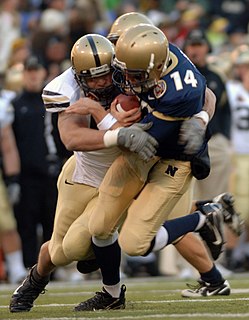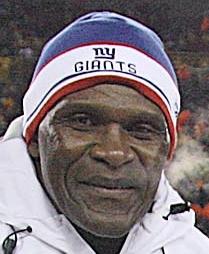Related Research Articles

Charles AaronSmith, commonly known as Bubba Smith, was an American football defensive end and actor. He first came into prominence at Michigan State University, where he twice earned All-American honors on the Spartans football team. Smith had a major role in a 10–10 tie with Notre Dame in 1966 that was billed as "The Game of the Century." He is one of only six players to have his jersey number retired by the program. He was inducted into the College Football Hall of Fame in 1988.

Christopher John Nowinski is an American neuroscientist and author. After extensively researching concussions in American football, Nowinski co-founded the Concussion Legacy Foundation, where he is currently the CEO, and co-founded Boston University's CTE Center. He is also a former professional wrestler, notably wrestling for World Wrestling Entertainment (WWE).
Michael Lewis Webster was an American professional football player who was a center in the National Football League (NFL) from 1974 to 1990 with the Pittsburgh Steelers and Kansas City Chiefs. He is a member of the Pro Football Hall of Fame, class of 1997. Nicknamed "Iron Mike", Webster anchored the Steelers' offensive line during much of their run of four Super Bowl victories from 1974 to 1979 and is considered by many the greatest center in NFL history.

Pop Warner Little Scholars, commonly known simply as Pop Warner, is a nonprofit organization that provides activities such as American football, for over 425,000 youths aged 5 to 16 years old, in several nations. It is the largest youth football organization in the United States.

Health issues in American football comprise a large number of health risks associated with participating in the sport. Injuries are relatively common in American football, due to its nature as a full-contact game. Injuries occur during both practice and games. Several factors can affect the frequency of injuries: epidemiological studies have shown older players can be at a greater risk, while equipment and experienced coaches can reduce the risk of injury. Common injuries include strains, sprains, fractures, dislocations, and concussions. Concussions have become a concern, as they increase the risk of mental illnesses like dementia and chronic traumatic encephalopathy (CTE). In individual leagues like the National Football League (NFL) and National Collegiate Athletic Association (NCAA), a public injury report is published containing all injured players on a team, their injury and the game-day status of each player.

Harry Donald Carson is a former American football middle linebacker who played his entire professional career for the New York Giants of the National Football League (NFL). Carson was inducted into the College Football Hall of Fame in 2002 and the Pro Football Hall of Fame in 2006.

Chronic traumatic encephalopathy (CTE) is a neurodegenerative disease linked to repeated trauma to the head. The encephalopathy symptoms can include behavioral problems, mood problems, and problems with thinking. The disease often gets worse over time and can result in dementia. It is unclear if the risk of suicide is altered.

High school football is gridiron football played by high school teams in the United States and Canada. It ranks among the most popular interscholastic sports in both countries, but its popularity is declining. According to The Washington Post, between 2009 and 2019, participation in high school football declined by 9.1%. It is the basic level or step of tackle football.

Andre Maurice Waters was an American football safety who played for the Philadelphia Eagles and Arizona Cardinals of the National Football League (NFL) from 1984 to 1995. Waters was regarded as one of the NFL's dirtiest players, serving as an integral part of one of the league's top defenses. On November 20, 2006, Waters committed suicide and was subsequently diagnosed with chronic traumatic encephalopathy.

Paul Kevin Turner was a professional American football fullback. He played eight seasons in the National Football League for the New England Patriots and Philadelphia Eagles. Turner died after a multi-year battle with amyotrophic lateral sclerosis (ALS), which had been triggered by chronic traumatic encephalopathy (CTE).
Thomas McHale was an American football player. He played professionally as an offensive guard in the National Football League (NFL) with the Tampa Bay Buccaneers (1987–1992), Philadelphia Eagles (1993–1994) and Miami Dolphins (1995). Born in Gaithersburg, Maryland, he attended Gaithersburg High School and then Wyoming Seminary in Kingston, Pennsylvania before playing college football at Maryland (1983) and Cornell (1986), graduating from the Cornell University School of Hotel Administration. Playing as a defensive end, he was named all-Ivy League and first-team All-American in 1986, and was runner-up for Ivy League Player of the Year. He was named to the Cornell Athletic Hall of Fame in 1993.
Bennet Ifeakandu Omalu is a Nigerian-American physician, forensic pathologist and neuropathologist who was the first to discover and publish findings on chronic traumatic encephalopathy (CTE) in American football players while working at the Allegheny County coroner's office in Pittsburgh. He later became the chief medical examiner for San Joaquin County, California, and is a professor at the University of California, Davis, department of medical pathology and laboratory medicine. He is currently the President and Medical Director of Bennet Omalu Pathology.
Concussions and play-related head blows in American football have been shown to be the cause of chronic traumatic encephalopathy (CTE), which has led to player deaths and other debilitating symptoms after retirement, including memory loss, depression, anxiety, headaches, stress, and sleep disturbances.
Concussions, a type of mild traumatic brain injury, are a frequent concern for those playing sports, from children and teenagers to professional athletes. Repeated concussions are a known cause of various neurological disorders, most notably chronic traumatic encephalopathy (CTE), which in professional athletes has led to premature retirement, erratic behavior and even suicide. A sports-related concussion is currently defined as a "complex pathophysiological process affecting the brain, induced by biomechanical forces". Because concussions cannot be seen on X-rays or CT scans, attempts to prevent concussions have been difficult.

Ann McKee is a neuropathologist and expert in neurodegenerative disease at the New England Veterans Affairs Medical Centers (VISN-1) and is professor of neurology and pathology at Boston University School of Medicine and director of Boston University CTE Center. She is particularly known for her work studying Alzheimer's disease and the consequences of repetitive traumatic brain injury. In 2017, she was named "Bostonian of the Year" by The Boston Globe for her leading work in this area, and in 2018, Time named McKee one of its 100 most influential people.

Concussion is a 2015 American biographical sports drama film written and directed by Peter Landesman, based on the exposé "Game Brain" by Jeanne Marie Laskas, published in 2009 by GQ magazine. Set during the 2000s, the film stars Will Smith as Dr. Bennet Omalu, a forensic pathologist who fights against the National Football League trying to suppress his research on chronic traumatic encephalopathy (CTE) brain degeneration suffered by professional football players.
Joseph Maroon is an American neurosurgeon, author, and triathlon athlete. He is the professor and vice chairman of the Department of Neurological Surgery at the University of Pittsburgh Medical Center, and is the current medical director of WWE. He is particularly known for his work studying concussions and concussion prevention as well as his hypothesis on the development of chronic traumatic encephalopathy (CTE).

The Boston University CTE Center is an independently run medical research lab located at the Boston University School of Medicine. The Center focuses on research related to the long-term effects of brain trauma and degenerative brain diseases, specializing in the diagnosis and analysis of chronic traumatic encephalopathy (CTE). According to researchers at Boston University, CTE is a brain disease involving progressive neurological deterioration common in athletes, military personnel, and others who have a history of brain trauma. The disease is primarily caused by repeated blows to the head, some of which result in concussions or sub-concussive symptoms.
Most documented cases of chronic traumatic encephalopathy have occurred in athletes involved in contact sports such as boxing, American football, wrestling, ice hockey, mixed martial arts, rugby and soccer. Other risk factors include being in the military, prior domestic violence, and repeated banging of the head. The exact amount of trauma required for the condition to occur is unknown. Below is a list of notable cases of CTE in sports.
Daniel H. Daneshvar is an American neuroscientist, brain injury physician, and physiatrist. He is known for his academic work in traumatic brain injury and the long-term consequences of repetitive head impacts, including chronic traumatic encephalopathy (CTE). He also founded Team Up Against Concussions, the first scientifically validated concussion education program for children. He is the Director of the Institute for Brain Research and Innovation at TeachAids, which created CrashCourse, a virtual-reality or video based concussion education program.
References
- ↑ NFLHS.COM - Youth Football Fund: How the NFL Can Help Archived 2007-11-16 at the Wayback Machine
- ↑ AYF - American Youth Football & Cheer Archived 2011-10-07 at the Wayback Machine
- ↑ Rising Stars Football Camp Archived July 3, 2008, at the Wayback Machine
- ↑ Randy Moss teams up with American Youth Football Archived 2011-05-19 at the Wayback Machine
- 1 2 "Study finds youth football tied to earlier symptoms of CTE," ESPN, April 30, 2018.
- 1 2 Parents, put off tackle football as long as possible, study suggests, Austin American-Statesman, Nicole Villalpando, May 25, 2018.
- ↑ Age of First Exposure to Tackle Football and Chronic Traumatic Encephalopathy, Annals of Neurology, Michael L. Alosco, Jesse Mez et al., 30 April 2018.
- ↑ Former NFLers call for end to tackle football for kids, CNN, Nadia Kounang, updated March 1, 2018.